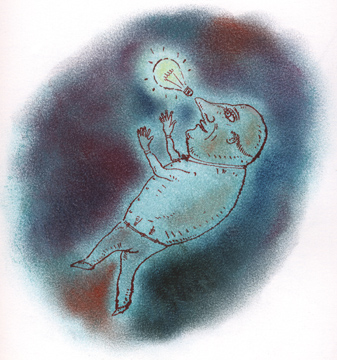|
2/10/2015 1 Comment What are Dreams Anyway? As mentioned in my Dream Work section, dreams are sometimes dismissed by some scientists as the random firing of cells in the brain during REM sleep. I frankly think this kind of assessment comes from the fear dreams can engender due to their being "irrational", chaotic, and by bringing to the fore ideas and behaviors that are completely unacceptable to the dreamer. That dreams really do have meaning is defended against by those who don't care to know about those meanings. But what is this meaning? Why is it so oddly presented and why can't dreams just present its meaning directly in the language we all are used to and can readily understand? Some of the reasons for this depend on the theory one subscribes to. A certain leap of faith may be required, at least initially. As one works with their dreams over time, it becomes unmistakable that dreams are not random or meaningless. It becomes all too obvious your mind is still very much at work in the service of processes that are psychological, and when dealt with carefully, can be very beneficial to our overall mental health: the broadening of our understanding, and expanding of psychological freedom and agency. As for why dreams are so odd and hard to cipher, that it a difficult question. In theory, when we dream the "guards" which defend against unacceptable thoughts and impulses are asleep on the job! During the waking state, we are well defended against what has perhaps long ago been deemed "unacceptable", and we keep such thoughts out of our conscious mind. Unacceptable thoughts tend to produce anxiety, seem "wrong" and scary. Keeping these sorts of ideas away from our conscious mind doesn't mean they don't still exist within us however. Such banished ideas reside in the unconscious where they are often not content to be! At night, with the guard asleep, these ideas in the unconscious start to come into play in dreams, but still not in a completely plain and obvious manner. Our mind will hide the unacceptable content even if the feelings are felt during the dream: guilt, aggression, lust, fear, etc. The feelings can also be very pleasant such as erotic excitement- maybe a guilty erotic pleasure we don't want to admit we yearn to experience. These issues can be subtle or like a sledgehammer- but something about the content is usually unacceptable to us, and thus comes out in a partially hidden/blocked form. The mind naturally expresses itself during dreaming with images rather than language and thoughts. So, as we look at and try to understand our dreams, we need to get comfortable with the symbolic language of that world within our mind. As we come to appreciate this magnificent language, we will find it can express a tremendous and profound message with just a simple, short dream. More on this in the next entry...
1 Comment
|
AuthorJames Staunton, MFT has worked with dreams for over 20 years, both from a Jungian and Psychoanalytic perspective. ArchivesCategories |
 RSS Feed
RSS Feed